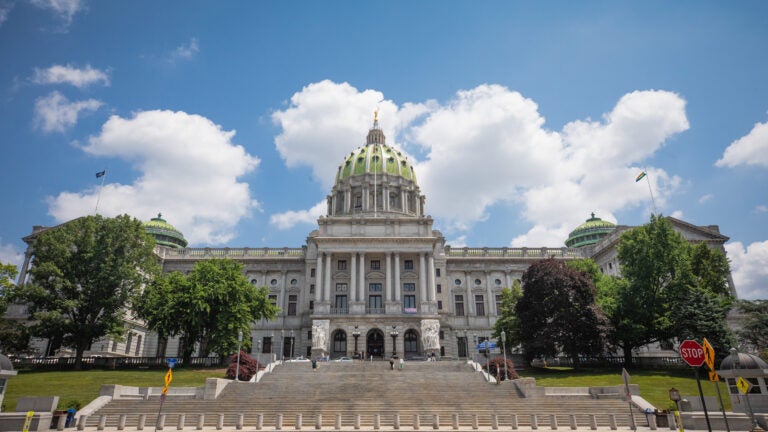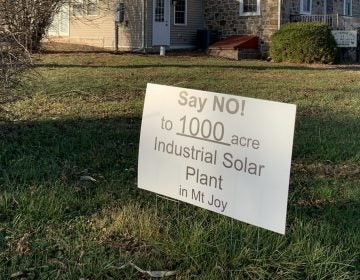Poll shows Pennsylvanians support climate action amid pandemic
Forty-two percent of the 444 registered voters surveyed said that Pennsylvania should “definitely” do more to combat climate change and its impacts.

The Pennsylvania Capitol is pictured in a file photo. (Office of Gov. Tom Wolf)
This story originally appeared on StateImpact Pennsylvania.
Most Pennsylvania registered voters think the state should work harder to tackle climate change, according to a poll from Franklin & Marshall College that was released last week.
Forty-two percent of the 444 registered voters surveyed said that Pennsylvania should “definitely” do more to combat climate change and its impacts. That’s compared to 20 percent who answered “yes, probably,” 12 percent who answered “no, probably not,” and 22 percent who answered, “no, not at all.”
Berwood Yost, the director of F&M’s Center for Opinion Research, emphasized that 62 percent of voters chose one of the two “yes” categories.
He did point out that the share of “definitely” voters dipped from a high of 56 percent in March 2019, though more people choosing “probably” this time means that overall support for increased climate action hasn’t changed much. Yost believes this may reflect a reshuffling of voters’ priorities.
“There was a lot that happened between March 2019 and March 2021,” he said. “So when you’re asking what the state government should do, it’s not surprising that people might think it should be focused on other things besides the climate.”
Still, said Stanford political scientist Jared McDonald, fluctuations between “definitely” and “probably” voters are likely less significant than the steadiness of the “yes” category as a whole.
A recent report by McDonald’s research group and the nonprofit Resources for the Future finds that support for increased government action on climate change across the U.S. has hovered around 60 to 70 percent since the 1990s.
“What’s remarkable about it is actually how stable it’s been,” even during the height of the COVID-19 pandemic, McDonald said.
The idea that Pennsylvania ought to be doing more has garnered majority support since F&M first asked the question in March 2018.
McDonald thinks that shifts in the “definitely” and “probably” categories likely have more to do with which political party was in power when the surveys were conducted. He referred to a “thermostatic” effect: if one party has controlled policy decisions for a while, the public tends to sway in the opposite direction when asked about those policies.
In March 2019, McDonald pointed out, the Trump administration was pursuing the rollback of a wide array of environmental regulations. Against that backdrop, he said, “the public thinks, ‘Well, maybe we’ve gone too far.’” He believes that could explain the increased share of “definitely” votes in the March 2019 F&M poll.
Thursday’s poll comes on the heels of an update to the Pennsylvania Department of Environmental Protection’s Climate Impacts Assessment, which projects that extreme heat, rainfall, and flooding — already affecting the state today — are on track to worsen by mid-century. And these hazards will not be evenly distributed, the DEP predicts: low-income communities, communities of color, and those with chronic medical conditions face greater risk from the impacts of climate change.
The report warns that the Commonwealth must take action to “avoid and reduce” the most severe consequences.
The F&M poll suggests that the proper kind of action is a matter of debate among Pennsylvanians. Some rely on the fossil fuel industry for jobs, while others advocate for a shift to renewable sources to lessen the climate impact of the energy sector.
For instance, 51 percent of respondents said that the state should “pursue policies that prioritize the availability of renewable energy such as solar and wind” over fossil fuels, while 33 percent said the opposite. Another 10 percent said the state should pursue whichever energy policy produces the “best value for consumers.”
Yost said those divisions largely tracked political affiliation, with Republicans more likely to choose fossil fuels and Democrats more likely to choose renewable energy.
Similarly, a relatively even split emerged over federal policy. Asked about President Biden’s campaign promise to eliminate carbon emissions from U.S. electricity generation by 2035, 53 percent responded that they would favor such a policy, and 45 percent said they would oppose it.
The F&M poll was conducted over the phone or online. Yost said the sample reflected Pennsylvania demographics of race and was weighted to reflect demographics of age, gender, education, geography, and party registration. The margin of error was +/- 6.4 percentage points.

Get daily updates from WHYY News!
WHYY is your source for fact-based, in-depth journalism and information. As a nonprofit organization, we rely on financial support from readers like you. Please give today.





